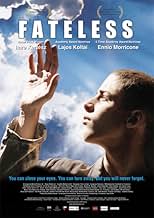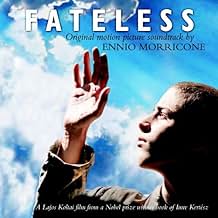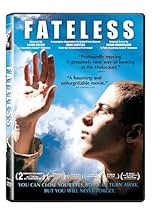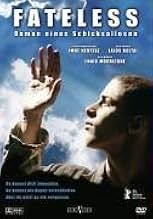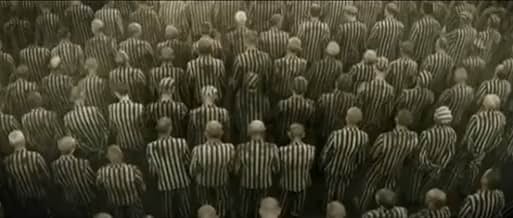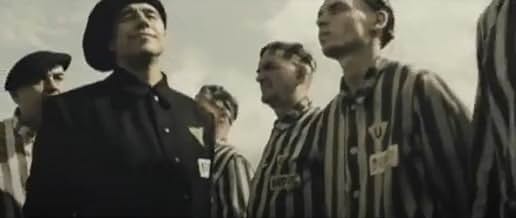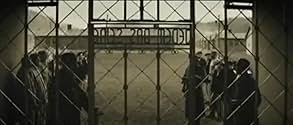La vida de György, de 14 años, se desgarra en la Hungría de la Segunda Guerra Mundial, cuando es deportado primero a Auschwitz y luego a Buchenwald, donde se ve obligado a sobrevivir en medi... Leer todoLa vida de György, de 14 años, se desgarra en la Hungría de la Segunda Guerra Mundial, cuando es deportado primero a Auschwitz y luego a Buchenwald, donde se ve obligado a sobrevivir en medio del odio, y lo que significa ser judío.La vida de György, de 14 años, se desgarra en la Hungría de la Segunda Guerra Mundial, cuando es deportado primero a Auschwitz y luego a Buchenwald, donde se ve obligado a sobrevivir en medio del odio, y lo que significa ser judío.
- Premios
- 6 premios ganados y 7 nominaciones en total
- Moskovics
- (as Dani Szabó)
Opiniones destacadas
We first meet Gyorgy Koves as a curly headed handsome 14-year old youth in 1944 bidding farewell to his beloved father as he departs for a labor camp. Wearing the yellow star of David proudly, Gyorgy has little understanding of what it is to be a Jew, a lesson he will learn in the coming year and affect his perception of the world and his place in it. Gyorgy's mother left his father and his father has remarried and requests that Gyorgy stay with his stepmother while he is away 'for a while' in the labor camp. Gyorgy is conflicted as he loves his mother but he does as his father requests. Almost inadvertently Gyorgy and his friends are taken off a bus and separated by the Nazis into trains bound for concentration camps. Gyorgy remains relatively naive about what is happening: his head is shaved, his worldly goods are absconded, and he begins the hellish life of survival in Auschwitz. Where Kertesz writes differently than other authors who have described Holocaust conditions is in his mindset of Gyorgy: Gyorgy strives to retain a sense of equilibrium in this bizarre new life, seeing certain events as probable errors, mistakes, or simply 'the way things are'. He endures starvation, brutal work, pain from an injured and infected knee, boredom, and observing sights of torture of his fellow prisoners. Though he is walking in a stunned world, he is still able to fine the little moments of 'happiness' because of his youthful outlook and creative mind. He gradually grows to understand what being a Jew means, and while he is unable to fathom all he sees in captivity, he learns that if he can't understand life in a concentration camp, how can he understand life outside either. Gyorgy is literally on the carts moving toward the crematorium when the Allies free the camp. He meets an American (Daniel Craig) who suggests he not return to Budapest, but go to America instead where he can pursue a new existence. Yet Gyorgy's devotion to family, to country, and to being a Jew returns him to Budapest where he finds a destroyed city that had been home and wanders the town square trying to make sense of it all.
As Gyorgy Koves, Marcell Nagy gives a stunning performance, a picture of a child/man who is forced to enter the world of adulthood via the horrors of Auschwitz. Nagy captures the essence of the character with minimal dialogue and maximum use of his body language and eyes. The supporting cast is superb, each creating vignettes in the few moments we see them that burn into our memory. The cinematography by Gyula Pados uses subdued color for the scenes outside the camps and a subtle sepia toned black and white or the scenes within the walls of the terrifyingly real buildings and yards of the camps. The musical score by Ennio Morricone sustains the mood throughout. But it is the director Lajos Koltai whose impeccable sensitivity to Kertesz' writing and vision that makes this long (140 minutes) film a seamless pondering of the passage of time - minute by minute, hour by hour, day by day, etc - that is the essence of Gyorgy's survival of a nightmare 'with little moments of happiness wherever they may happen'. This is a magnificent film, by a gifted crew, and though it contains visuals that will crush your heart, it must be seen to be believed. In Hungarian and German and English with subtitles. Highly Recommended. Grady Harp
Marcell Nagy is outstanding as Gyuri, the young man who moves from a childlike innocence to world-weariness in the span of one year. With his soulful face and expressive eyes, he is almost a detached observer, quietly pondering his fate. He is, in the Sufi saying, in the world, but not of it and the film unfolds as in a lucid dream that blurs the lines between appearance and reality. Koltai captures this almost matter-of-fact quality as Gyuri says goodbye to his father (Janos Ban) who has been ordered to work in a Nazi labor camp. Because Hungarians did not feel the full brunt of Nazi persecution until the Nazi takeover in 1944, Gyuri thinks his father is just going to have to work hard and that nothing will happen to him. Neighbors and relatives who reassure him that everything will be all right do not further his grasp of reality.
When the boy and his friends are detained on a bus on the way to work, he learns quickly that "his carefree childhood days are now over". Still not comprehending the magnitude of what is taking place, he is annoyed but not frightened and does not seize the opportunity to escape offered by a friendly cop. Even when he arrives at Auschwitz, he sits on the ground shaven and wearing a striped uniform, talking with friends as if he was in a school playground during recess. When Gyuri discovers that "he could be killed at any time, anywhere", he attains a sort of spiritual freedom and his determination to survive is increased. Pretending to be sixteen, Gyuri escapes the gas chamber and is sent to Buchenwald and then to a smaller camp.
The scenes of murder, death, and dying at the camps are thankfully left to the imagination and the film focuses on Gyuri's personal reactions to what he sees around him. Koltai, a cinematographer for twenty-five years, creates a visual cinematic poem in which his color palette is so muted that we experience the mud and the atmosphere of cold and gray almost viscerally. Sadly, we watch Gyuri's transformation from the confident teenager we saw at the beginning to an emaciated number, his leg so swollen and infected that he can barely walk. In voice-over, however, he talks about the hours between work and the evening meal as one of quiet reflection and about the joy in discovering a piece of meat or potato in his soup. He is also sustained by a friend he develops in fellow Hungarian Bandi Citrom (Aron Dimeny) who protects him and tries to teach him the skills of survival. Bandi, ever the optimist, proclaims, "I will walk down Nefelejcs Street again" One of the surprises in the film is the treatment Gyuri receives at what looks like a camp hospital.
He is cleaned, allowed to sleep alone in a bed and taken care of, a set of circumstances not usually associated with extermination camps, yet based on Kertesz' actual experience. The most discussed aspect of the film, however, takes place in Budapest after the liberation. Gyuri feels more alone than he did at Buchenwald and even expresses a sort of homesickness for the camaraderie he felt at the camp. Friends and neighbors who were not in the camps cannot understand what it was truly like and Gyuri cannot explain it. Even if he could, no one really wants to hear anything that rattles their preconceptions.
He rebels at playing the role of the victim and says, "there is nothing too unimaginable to endure". When asked about the atrocities, he talks of his happiness. "The next time I am asked", he says, "I ought to speak about that, the happiness of the concentration camp. If indeed I am asked. And provided I myself don't forget". His "happiness", according to Kertesz, who also wrote the screenplay, is not a form of denial but an act of rebellion against those who do not see him any longer as a human being, only as a victim. It was a way of assuring his responsibility, of defining his own fate rather than having others decide it for him. For me, it also added a portal into the sublime.
There are weaknesses too, of course, some dialogues, mainly in the beginning of the film are not natural (maybe it comes from Kertész's newness in film-writing), it' very disturbing as some weak acting in a few episodes. Marcell Nagy is not a bad choice for the leading role, he has the look and the power in his eyes but in speech he's not convincing, it drops you out of the atmosphere sometimes but it won't bother the not-Hungarian audience.
'Fateless' is an impressive European masterpiece, Hungary should be proud of it.
The film is long but very compelling and speaks loudly about man's inhumanity to his fellow man. The message is even more disturbing when told through the eyes of a young teenager who is caught up in the atrocities of the Nazis and their Hungarian allies.
If this film were in English or directed by Steven Spielberg, it would no doubt win numerous awards. Let us hope that "Fateless" is recognized for it's bravery and excellence.
¿Sabías que…?
- TriviaThe production unexpectedly ran out of money halfway through and halted for several months in order to find new investors. This ended up working in its favor, since Marcell Nagy was going through puberty, and by the time they restarted, he looked physically more mature, taller, and his voice deeper. By the time his character enters and survives the death camp, he looks several years older than when the film began, adding an element of reality that otherwise would have been created with make-up.
- Citas
[last lines]
György Köves: [narrating] People only ask about the horrors, whereas I should talk about the happiness of the camps next time, if they ask. If they ask at all. And if I don't forget myself.
- Créditos curiososFlash v. Schwabenland, Production Dog
- Bandas sonorasHoldvilágos éjszakán (On a Moonlit Night)
Music by Mihály Eisemann
Lyrics by István Zágon
Sung by the four boys when the group is in transit
Selecciones populares
- How long is Fateless?Con tecnología de Alexa
Detalles
- Fecha de lanzamiento
- Países de origen
- Sitios oficiales
- Idiomas
- También se conoce como
- Fateless
- Locaciones de filmación
- Productoras
- Ver más créditos de la compañía en IMDbPro
Taquilla
- Presupuesto
- HUF 2,500,000,000 (estimado)
- Total en EE. UU. y Canadá
- USD 196,857
- Fin de semana de estreno en EE. UU. y Canadá
- USD 12,680
- 8 ene 2006
- Total a nivel mundial
- USD 2,512,009
- Tiempo de ejecución
- 2h 20min(140 min)
- Color
- Mezcla de sonido
- Relación de aspecto
- 2.35 : 1





